Merz Brings Germany Back to the Table
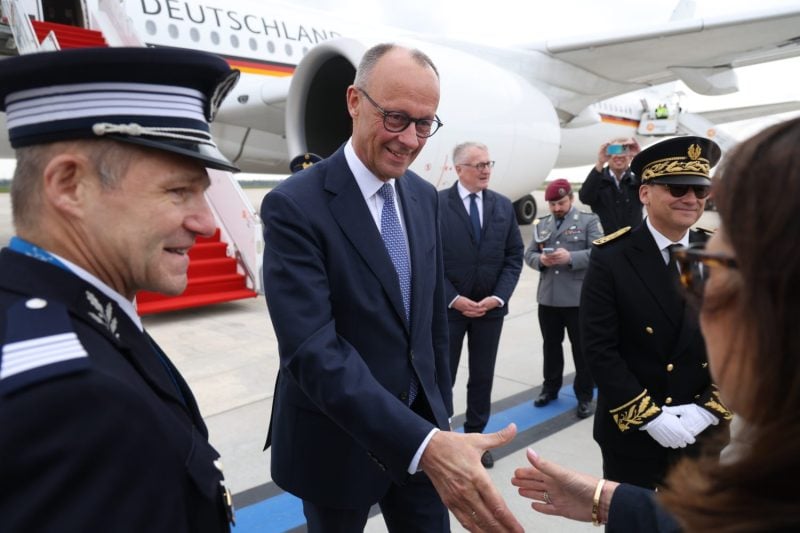
Merz Brings Germany Back to the Table
The new chancellor has moved quickly to fix years of foreign policy dysfunction in Berlin.
On his first foreign trip one day after taking office, new German Chancellor Friedrich Merz arrives at Orly Airport outside Paris before his meeting with French President Emmanuel Macron on May 7. Sean Gallup/Getty Images
It has taken Germany a frustratingly long six months from the collapse of Chancellor Olaf Scholz’s government to a snap election to Tuesday’s swearing-in of Friedrich Merz as Scholz’s successor. Even then, it took Merz an unusual two rounds of voting in the German parliament before he finally took the helm.
With war raging in Ukraine, almost daily Russian threats against Europe, and deepening trans-Atlantic rifts under U.S. President Donald Trump, Merz has promised to end the long paralysis in German foreign policy. Most importantly, he seeks to accomplish the Zeitenwende—or change of eras—in security and defense that Scholz declared but did little to follow up on.
It has taken Germany a frustratingly long six months from the collapse of Chancellor Olaf Scholz’s government to a snap election to Tuesday’s swearing-in of Friedrich Merz as Scholz’s successor. Even then, it took Merz an unusual two rounds of voting in the German parliament before he finally took the helm.
With war raging in Ukraine, almost daily Russian threats against Europe, and deepening trans-Atlantic rifts under U.S. President Donald Trump, Merz has promised to end the long paralysis in German foreign policy. Most importantly, he seeks to accomplish the Zeitenwende—or change of eras—in security and defense that Scholz declared but did little to follow up on.
The new government promises strategic coherence after years of fragmentation. The choices for key personnel and institutional reforms announced so far suggest that, for the first time in years, German foreign policy may speak with a single coherent voice rather than a cacophony of squabbling coalition parties and factions. We will have to see how it works out in practice, but it’s hard to overstate the significance of this break with past German foreign-policy governance.
Merz has deliberately centralized foreign and security policy coordination in the chancellery. To start, he has done away with the long-standing tradition of giving the Foreign Office to the main coalition partner, a practice that baked in foreign-policy dysfunction by setting up a separate power base held by a different political party. Now, for the first time since 1966, the chancellor and foreign minister will be from the same party—in this case, the Christian Democratic Union (CDU). New Foreign Minister Johann Wadephul is a party loyalist who will ensure alignment rather than competition with the chancellor.
Within the chancellery—where all important foreign-policy decisions are made—Merz has appointed close confidants to key posts: Jacob Schrot, a trusted trans-Atlanticist, as head of the newly created German National Security Council; veteran diplomat Günter Sautter as foreign-policy lead; and Michael Clauss to handle European Union affairs, which Merz wants to make a core strategic portfolio and to which Clauss brings credibility and experience, including significant work on China.
This consolidation of power is accompanied by overdue institutional reforms. The creation of a National Security Council in the chancellery is more than a bureaucratic tweak—it will be the first time that Berlin has a body to coordinate security policy across ministries and agencies, plan ahead, and integrate diplomacy, defense, and economic policy. Although it has been on the agenda for decades, past governments failed to establish such a body due to coalition and interagency turf wars. Whether the new body will become a true enabler of German strategic action—or just another bureaucratic coordination round—will be an early test of Merz’s promise to restore seriousness to German foreign policy.
Weekly interministerial EU coordination rounds aim at ending another element of foreign-policy dysfunction during the Scholz era. Merz plans to end the pattern of German abstentions in Brussels, a frequent symptom of unresolved disagreements in Berlin under Scholz, which has angered European partners in the last few years.
A smart personnel move and signal of the new government’s expected strategic heft is the retention of Boris Pistorius as defense minister. He combines credibility with broad public support and has emerged as a rare hawkish voice within the Social Democratic Party (SPD). Pistorius not only may accelerate rearmament but will help insulate the new government’s Ukraine and Russia policies from internal SPD opposition—the significant parts of the party that remain skeptical of rearmament and favor closer relations with Russia. Pistorius is the most popular SPD politician in Germany, which makes it difficult for those factions to oppose him.
Another signal that the SPD will stay the course on rearmament and support for Ukraine is the appointment of SPD co-chair Lars Klingbeil as vice chancellor and finance minister, the second-most important position in the German government after the chancellor. Young and ambitious, Klingbeil has centralized power in the SPD in his hands. He has a strong defense background as the son of a soldier and with a military base in his constituency.
Merz himself can best be understood as a traditional West German conservative—instinctively Atlanticist, deeply Francophile, unquestioningly supportive of the EU, but also pragmatic about new strategic realities. His decision to immediately travel to Paris and Warsaw after his swearing-in signals a deliberate effort to rebalance Germany’s European diplomacy between west and east. A visit to Brussels to meet with EU and NATO leaders is set to follow, with London and Kyiv lined up in the next few weeks as well.
Despite his Francophile background, he has vowed not to overlook the interests of Germany’s eastern neighbors. He traveled to Kyiv multiple times, including during the election campaign, and was more supportive than Scholz of delivering German weapons to Ukraine, including the powerful Taurus missile. He is convinced that Ukraine’s defense is also Europe’s defense.
How that translates into concrete policy remains to be seen. Merz has shrouded his Ukraine plans in secrecy, claiming that he did not want to broadcast his strategy to Russian President Vladimir Putin. (The bigger reason was probably that focusing too much on weapons and war would have been a risky move in the campaign.) He has been very cautious about German participation in a European peacekeeping force in Ukraine. This is a highly controversial topic in Germany, and as long as no U.S. backstop is forthcoming—meaning, a guarantee that a Russian attack on a European force in Ukraine would lead to a U.S. reaction—Merz is unlikely to make any public commitments. Pistorius has been active in NATO-level discussions, and Germany will likely participate in some form if a force comes into existence.
Merz will also have to find a role for himself in European diplomacy with Trump, which has been dominated by British Prime Minister Keir Starmer and French President Emmanuel Macron so far. A visit to Washington has yet to be scheduled. As a conservative Atlanticist with a corporate resume, Merz was once seen as Berlin’s best hope for dealing with Trump. But in the wake of U.S. Vice President J.D. Vance’s remarks at this year’s Munich Security Conference, which cast doubt on future U.S. defense commitments, and support for the far-right Alternative for Germany (AfD) party, Merz told Washington to “stay out” of German politics. In what was widely interpreted as a turnaround from his past Atlanticism, he also argued that Europe must “end its dependency” on the United States.
The CDU-SPD coalition agreement—a detailed blueprint for Merz’s tenure—tells a different story. The document reaffirms Germany’s “central” relationship with the United States and commits Berlin to NATO’s core obligations. Merz clearly sees the risks posed by a second Trump administration but isn’t prepared to rupture ties unless Washington moves first. Germany will continue investing in European defense and hedging against U.S. unpredictability, but it won’t unilaterally downgrade the alliance. This is strategic patience dressed in sober language: Build capacity at home, but don’t provoke unnecessarily. Berlin’s bet is that European strength—not confrontation with Washington—is the better form of insurance.
Despite rhetorical nods to European strategic sovereignty, however, the near-term focus on defense is domestic: unblocking procurement, fixing supply chain failures, and accelerating arms contracts. Ahead of June’s NATO summit in The Hague, Berlin’s overriding priority is survival: keeping the alliance alive and buying time, not sketching out a post-trans-Atlantic Europe.
Germany is not putting its trust in the EU to organize the continent’s defense anytime soon. Berlin wants London to be part of future European defense and has no appetite for military leadership that overshadows its European partners. That doesn’t mean Berlin’s role is passive. Far from it: With the largest defense budget in Europe, how Germany spends will shape Europe’s trajectory. Procurement choices made in the next 12 to 18 months could either entrench siloed national structures or serve as the catalyst of a more integrated European defense effort.
Less clear is where Merz will end up on the China debate. Should Europe use China as a hedge against the United States—for example, by reviving the Comprehensive Agreement on Investment with China that was put on ice in 2021? Or would closer ties with China counter European economic and security interests? Merz appears to have understood the risks China poses to Europe—particularly the German economy—regardless of how the trans-Atlantic relationship develops. The fact that his newly installed EU advisor is a former German ambassador to China might imply that Merz is looking to pursue a European response to this challenge, and Brussels has lately been hawkish on China. But he has said little about the threat from Chinese exports or about China’s support for Russia’s war in Ukraine.
Even before assuming the chancellorship, Merz already used substantial political capital to push through a reform of Germany’s so-called debt brake, a constitutional limit on government deficits. All defense spending beyond 1 percent of GDP is now exempt from the brake. But this early heavy lift cost Merz a lot of credibility among the fiscal hawks in his party, given that one of his key campaign pledges was not to touch the debt brake. Conservatives also complain that the Social Democrats got a better deal out of the coalition negotiations than they should have based on their weak showing in the election. Merz’s fragile support base became evident in Tuesday’s vote, in which 18 parliamentarians from the two coalition parties initially denied him the vote to become chancellor. This first-ever mishap does not bode well: With its small majority in the Bundestag, Merz’s coalition is not as strong as he might wish, and the AfD just overtook the CDU in nationwide opinion polls. Instability at home and within the coalition remains as much a risk to Merz’s government as it had been to Scholz’s.
For now, however, Merz can conduct foreign policy with an alignment that is rare in German politics. Moreover, a new architecture of strategic coordination—a first-ever National Security Council—will soon be in place in Berlin. If another earthquake happens, such as a U.S. withdrawal from NATO, the new German government will be better prepared with more cards to play. Berlin’s unhelpful foreign-policy abstinence under Scholz is now over. Expect good and solid implementation from Germany, which has returned as a reliable European ally and partner.
Sophia Besch is a fellow in the Europe Program at the Carnegie Endowment for International Peace. X: @SophiaBesch
Liana Fix is a Europe fellow at the Council on Foreign Relations, a former program director for European security at the Körber Foundation, and a former fellow at the German Marshall Fund. X: @LianaFix
More from Foreign Policy
-

Eight people dressed in camouflage military combat uniforms wade across a river, the water up to their waists. The soldiers carry large backpacks along with their rifles. Snowcapped mountains and a thick forest of evergreen trees loom in the distance. Get Ready for the Aleutian Island Crisis
As conflict heats up in the Arctic, foreign adversaries eye Alaskan territory.
-

U.S. President Donald Trump speaks to reporters before boarding Air Force One at Morristown Municipal Airport in Morristown, New Jersey, on April 27. Trump’s First 100 Days Reveal a ‘Strongman’s’ Unprecedented Weakness
No U.S. president has ever surrendered global power so quickly.
-

An elderly man and woman sit on the ground, the man on his knees as he sorts through something on the ground. Behind him are a rusted cart and bicycle in front of a paint-smeared concrete wall and a battered corrugated metal sign with the words USAID: From the American people” on it. What Trump’s New Budget Says About U.S. Foreign Policy
The president wants to significantly pull back on many of America’s traditional global engagements while spending more on the border and defense.
-

U.S. President Donald Trump listens to Secretary of State Marco Rubio at a cabinet meeting in the White House in Washington, D.C. Rubio’s Reorganization Plan Is a Wrecking Ball
The State Department revamp goes far beyond streamlining—it will devalue human rights and strip away critical expertise.
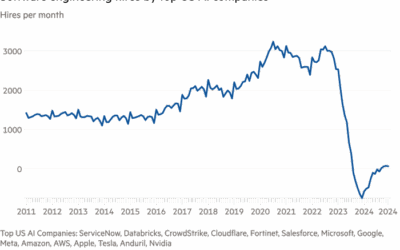
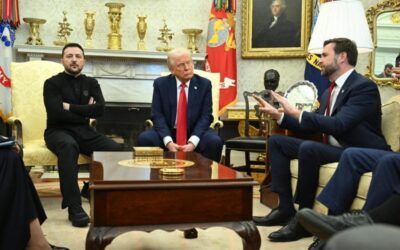




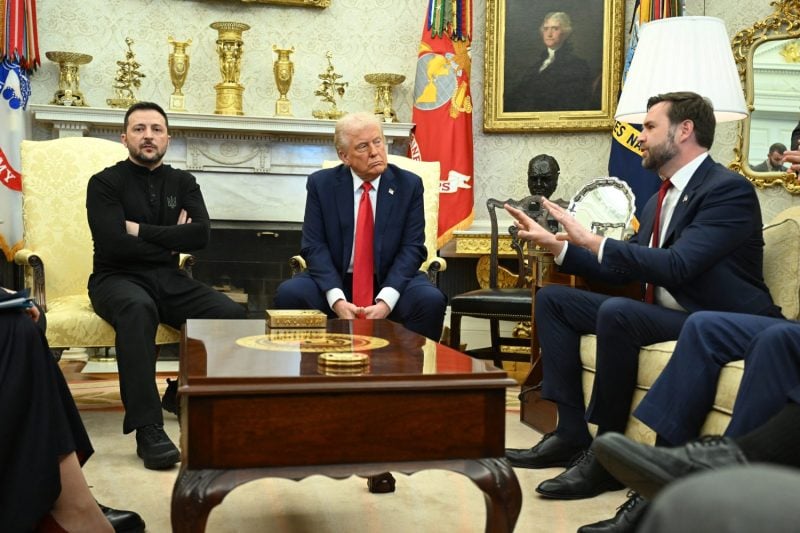


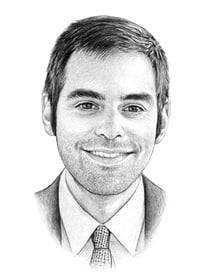
Join the Conversation
Commenting on this and other recent articles is just one benefit of a Foreign Policy subscription.
Already a subscriber?
.
Subscribe
Subscribe
View Comments
Join the Conversation
Join the conversation on this and other recent Foreign Policy articles when you subscribe now.
Subscribe
Subscribe
Not your account?
View Comments
Join the Conversation
Please follow our comment guidelines, stay on topic, and be civil, courteous, and respectful of others’ beliefs.
Change your username |
Log out
Change your username:
CANCEL
Confirm your username to get started.
The default username below has been generated using the first name and last initial on your FP subscriber account. Usernames may be updated at any time and must not contain inappropriate or offensive language.